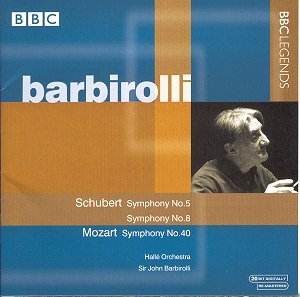Even for the confirmed Barbirolli admirer Ė and
I am one Ė there will be moments, I suspect, of unease listening
to this latest release in the BBC Legends series. Most centre
on the performance of the Fifth Symphony and parts of the Mozart,
though much less so there. So letís deal with the specifics of
the Fifth first. It was recorded at the Royal Albert Hall during
the 1968 Proms season and the rest of the concert comprised the
Elgar Cello Concerto with Vladimir Orloff, the JB Bax Oboe Quintet
transcription and Sibeliusí Fifth Symphony. I believe all these
items have been released in one form or another Ė the Bax in the
BBC series and the Elgar on Doremi. It may be the microphone placement
or the acoustic but the Symphony does open in a rather soft-grained
way; the contrastive material that follows is good with nicely
scaled dynamics and lower string accents and for portamento lovers
there are a number to excite curiosity here. My abiding impression
is one of affection but not distinction. Comparison with Beecham
in the slow movement shows that whilst the older man could certainly
be mannered in his phrasing, as his later Mozart recordings can
show, his Schubert was frequently beautifully phrased. Barbirolli
by comparison sounds very slightly manicured; it all sounds rather
too rehearsed as well. I like the rest of the performance rather
better but itís not a great one by any means.
That is not a criticism that can easily be levelled
at the Unfinished, which is deeply impressive. Here we
can hear something of what is to be a great conductor and how
the seeming spontaneity of lyric flow emanates from a practised
musician. The Allegro moderato is exceptionally inward and expressive
tinged with barely concealed despair. Barbirolli builds to the
climaxes unerringly and there is no sense at all of the somewhat
precious phrasing that bedevilled the earlier Symphony. Once those
climaxes are reached fortissimi are graded and controlled; horn
and lower string playing is distinguished. The end of the movement
has a kind of operatic complexity about it that is most moving.
And so it is with the Andante con moto where the phrasing is eloquent
and unforced, the animation and excitement effortlessly integrated;
lyricism is paramount and fine diminuendi are features of the
performance. The long lines of the Unfinished Ė at least
on these occasions Ė seem to have suited Barbirolli better and
they make for a most impressive reading.
I enjoyed the G minor but canít pretend itís
in the Schuricht class. The opening is quite slow and quite agitated;
a serious view of the movement and seriousness is the name of
the game for much of the symphony. The Andante is attractively
phrased but it was one of those occasions for me when it seemed
just too long. But Barbirolli brings something dark and clogged
and persuasive to the Menuetto; itís not at all sweet or polite
and the Trio is played for attractive contrast. The finale is
commanding.
There is one magnificent performance, one intelligent
and thoughtful one and one thatís to me less than stellar. On
balance that makes it a difficult choice for the uncommitted listener
but for the admirer there wonít be much hesitation, moments of
unease or otherwise.
Jonathan Woolf
